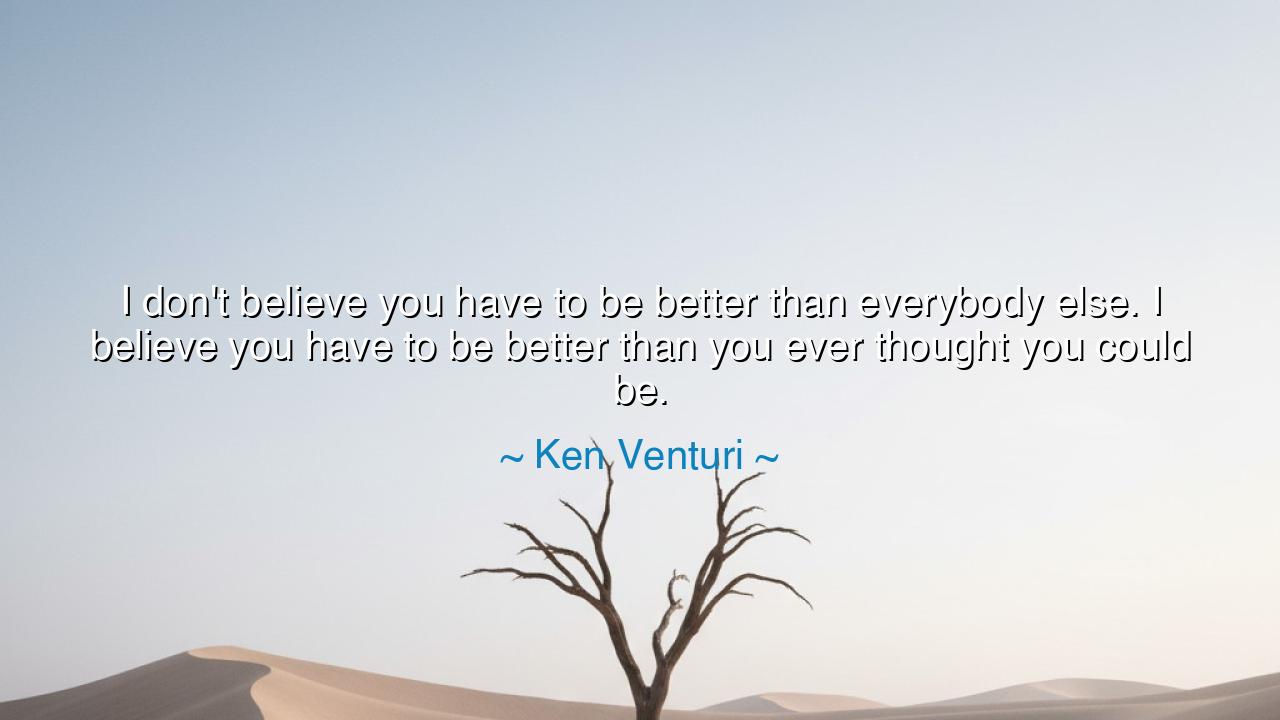
I don't believe you have to be better than everybody else. I
I don't believe you have to be better than everybody else. I believe you have to be better than you ever thought you could be.






Hear, O seeker of greatness, the words of Ken Venturi, the champion golfer who turned adversity into triumph: “I don’t believe you have to be better than everybody else. I believe you have to be better than you ever thought you could be.” In this teaching lies a wisdom deeper than competition, a wisdom that speaks not of conquering others, but of conquering the self. For the true contest of life is not waged against the neighbor, but against the limits we place upon our own spirit.
To strive to be better than everybody else is the way of vanity. It is a race without end, for there will always be another faster, stronger, or more fortunate. Such striving leads to jealousy, restlessness, and emptiness. But Venturi, who faced both victory and hardship, knew that this was not the true measure of man. The true measure lies in surpassing the self, in breaking through the walls of doubt and fear that whisper, “You cannot.”
To be better than you ever thought you could be is the heroic labor of self-mastery. It is to silence the voice of limitation and awaken the hidden strength within. Each man and woman carries in their heart untapped depths of courage, skill, and vision. The task is not to gaze endlessly at the progress of others, but to dig into one’s own soul and bring forth treasures never before imagined. This is the nobler pursuit, for it transforms envy into growth and turns the journey inward, where the greatest victories are won.
Consider the story of Wilma Rudolph. Born premature and stricken with polio as a child, she was told she would never walk again. She might have lived her life believing this verdict, measuring herself against the healthy and despairing. Instead, she chose the higher path: she sought to be better than she thought she could be. She learned to walk, then to run, and at last she sprinted into history, winning three Olympic gold medals. She did not defeat others only—she defeated her own limitations, and this was her true triumph.
So too with Ken Venturi himself. In the 1964 U.S. Open, he staggered under brutal heat, near collapse, yet pressed on. His battle was not merely against his opponents but against his own breaking body, his own doubts. By refusing to yield, he discovered within himself a strength he had never known. This is the heart of his teaching: success is not the fruit of surpassing the world, but of surpassing the self.
The meaning is plain: greatness is not comparison but transformation. To live by comparisons is to chain oneself to shadows, but to live by inner growth is to walk in freedom. The true warrior of life does not ask, “Am I better than my brother?” but asks, “Am I better than I was yesterday?” In that question lies the key to endless growth, for there is always a higher self to become.
O listener, take this wisdom into your own life. Do not measure yourself by the fleeting triumphs of others. Instead, look inward and ask: What strength lies hidden within me? What limit can I break today? Strive daily to rise above the self you once were—stronger in discipline, deeper in kindness, greater in courage. In this way, you will walk the noble path of endless becoming.
Thus the teaching of Venturi endures: “You do not have to be better than everybody else. You have to be better than you ever thought you could be.” This is the path of the wise, the humble, and the free. Walk it, and you will find that the greatest victory is not the crown won from others, but the crown you place upon your own spirit, forged by courage, effort, and faith.






AAdministratorAdministrator
Welcome, honored guests. Please leave a comment, we will respond soon